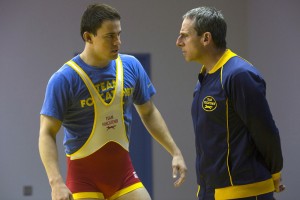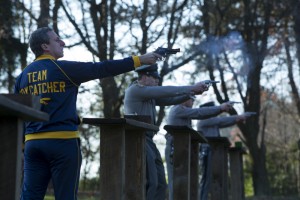
Sometimes truth really is stranger than fiction. Exemplifying this notion yet again is Foxcatcher, the latest film from director Bennett Miller (Capote, Moneyball). Like his previous efforts, this is another biopic based on real people. However, this story is much darker, following the strange relationship between a multimillionaire and a struggling Olympic athlete. Cold and depressing, perhaps the most accurate way to describe it is as a very good “feel-bad” movie.
 The adaptation begins in the late 1980s, recounting the tough life of freestyle wrestlers Mark Schultz (Channing Tatum) and his brother Dave (Mark Ruffalo). Despite being gold medalists in the 1984 Olympics and spending every waking hour training to defend their titles, they find themselves poor and struggling to survive. The situation changes dramatically when Mark is called on to visit John du Pont (Steve Carell), the obscenely wealthy heir to the Du Pont family fortune. At first, Mark is thrilled to train with his eccentric benefactor. But as the two grow more familiar, du Pont’s behavior becomes odder and his delusions grander, ultimately leading to tragedy.
The adaptation begins in the late 1980s, recounting the tough life of freestyle wrestlers Mark Schultz (Channing Tatum) and his brother Dave (Mark Ruffalo). Despite being gold medalists in the 1984 Olympics and spending every waking hour training to defend their titles, they find themselves poor and struggling to survive. The situation changes dramatically when Mark is called on to visit John du Pont (Steve Carell), the obscenely wealthy heir to the Du Pont family fortune. At first, Mark is thrilled to train with his eccentric benefactor. But as the two grow more familiar, du Pont’s behavior becomes odder and his delusions grander, ultimately leading to tragedy.
As someone who knows little about the actual events, it’s engrossing material. And even those familiar with the subject matter should find it an intriguing character study. Nothing is explicitly stated, but the movie offers some subtext that may explain the motivations of this odd couple. Mark appears desperate to live up to his brother’s reputation and du Pont is driven to win the respect of his disapproving mother. These two isolated and lonely individuals find common ground, but further complications arise when the more affable Dave appears. In a strange way, it seems that both men envy Dave’s natural talent, as well as his balance of work and family life.
 Tatum is more than convincing as the hapless wrestler. And Carell is unrecognizable as du Pont, offering an oddly measured tone that seems more and more disconcerting as his attitude and behavior change. The initial success of Mark leads du Pont to develop an even larger ego and sense of entitlement. His rhetoric and mantras become creepier and creepier as he progresses from a self-proclaimed, “ornithologist, philatelist and philanthropist,” to a bizarre and nonsensical “Golden Eagle.”
Tatum is more than convincing as the hapless wrestler. And Carell is unrecognizable as du Pont, offering an oddly measured tone that seems more and more disconcerting as his attitude and behavior change. The initial success of Mark leads du Pont to develop an even larger ego and sense of entitlement. His rhetoric and mantras become creepier and creepier as he progresses from a self-proclaimed, “ornithologist, philatelist and philanthropist,” to a bizarre and nonsensical “Golden Eagle.”
The look of the film is as detached and frozen as du Pont himself. Outside of the wrestling ring, scenes are shot in dull and cold hues. Miller also uses some visual cues to hit some of his points home. Many of millionaire’s speeches on success are shot among iconic American symbols. By the time he’s waving weapons and terrifying those around him, the opulence becomes unsettling and adds to a general feeling of decay. There are also dark but enjoyable moments in which the wrestlers are forced to take part in events and promotional videos. Of course, they are fed lines to promote not themselves, but their benefactor.
This is a deliberately paced picture that doesn’t provide straight answers to the rationale of John du Pont. It does leave a lot open to interpretation – after all, no one will ever really know what was going on in his noggin. Yet that is precisely what makes the movie engaging and interesting. Additionally, it provides striking insight into the psychological and financial toll of being an Olympian. In the end, Foxcatcher is a very compelling drama that isn’t much fun, but gives viewers plenty of thoughts to wrestle with after the credits roll.


